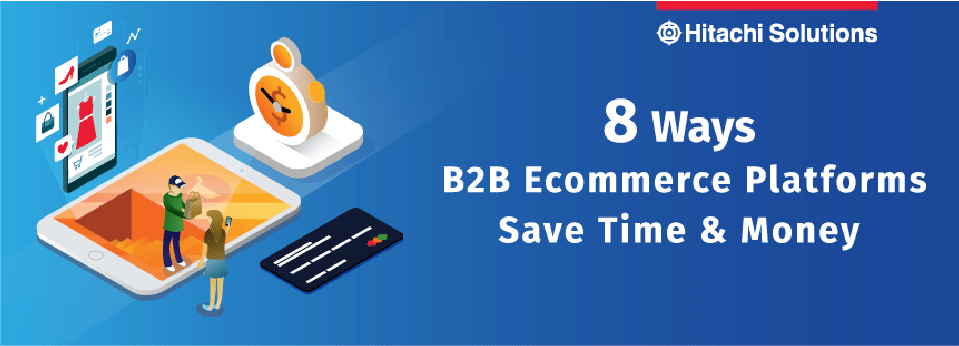

Why You Need a B2B Ecommerce Platform
B2B companies are realizing that an ecommerce platform is an important tool to sell products online and to keep their business on top. People working in B2B know that they need to focus on the customer experience and choosing an ecommerce platform is the most important factor for any B2B business.
Read the BlogModern consumers have a limited amount of time available to research and purchase products and services. But that’s the beauty of shopping online; you can research new brands, read product reviews, and make purchases from anywhere with an internet connection.
We use online sales channels to make personal purchases, so why wouldn’t we want the same convenience for business purposes? Below are eight ways that a B2B ecommerce platform will benefit your customers while also saving you time and money.
1. Extend Your Online Reach
Web stores enhance your online presence, making it easier for new customers to find you through search engines like Google and Bing. Since 89% of B2B decision makers use the internet during the research process, implementing an ecommerce strategy will help ensure that your website is able to compete on search engine results pages.
Even if the majority of your sales come from outbound strategies, referrals, or tradeshows, an ecommerce platform will serve as an additional way to earn revenue through a different share of the market. Plus, it will give you a competitive edge when it comes to those buyers who prefer purchasing online.
2. Minimize Operational Costs
An ecommerce platform uses the latest technology to help you automate a substantial portion of typically manual business processes. Tasks that would normally take a salesperson several minutes or even hours to complete — like checking inventory or processing a payment — can be done efficiently by the software without any interruption to your employees.
Since your sales team won’t be bogged down by as many tasks, they will have time to focus on other revenue-generating business initiatives.
3. Centralize Order Management
Since orders will be placed directly through your ecommerce platform, customer information can be collected and stored for easy reference. And by connecting to your existing business software — like your customer relationship management (CRM) system, enterprise resource planning (ERP) system, or other back-end tools — you can have an even more holistic view of your business. The automation behind ecommerce and connectivity to your other platforms will also keep all your information up to date, giving you faster processing time.
This will also support your customer service practices since employees will be able to easily find the information they need — like order numbers, delivery addresses, payment details, etc. — in one platform. Customers will be taken care of quicker and your team won’t spend endless amounts of time searching for once piece of information.
4. Get Paid Quicker
Many B2B businesses that rely solely on traditional, non-digital sales efforts often run into some difficulties getting paid on time. This can cause headaches for the sales team and delay the payment process for your business, potentially affecting your projected revenue goals.
An online ecommerce platform lets your customers pay instantly with their credit cards, ACH, or other payment options so you can get paid quicker and customers can receive their products sooner. You can also offer multiple payment options so that your customers can easily find their preferred method, increasing their comfort with your checkout process.
5. Service Customers 24/7/365
With an ecommerce platform, your customers aren’t confined to your office hours. No matter their time zone or availability, they can make purchases whenever it’s most convenient for them because your web store will always be open.
This self-service option empowers your customers to make decisions when it’s best for them, so they will be more likely to buy. Your salespeople will also save time, since they won’t need to verify inventory or play phone tag with customers to provide a quote or start an order. In addition, anyone who creates an account on your site can log in whenever they need to view their invoice history, track orders, or update their personal information.
6. Decrease Chances of Error
Orders that are handled manually are susceptible to human error. Illegible handwriting, misplaced paperwork, and inconsistent communication processes can lead to a loss of profits and a poor customer experience.
With an ecommerce platform, everything is digital and stored in the cloud for easy reference. Instead of a possibly unreliable paper trail, you’ll have a digital footprint of every purchase and interaction with your customers. In connection with your CRM solution, you can also make manual updates to customer profiles to add notes that may not be automated.
7. Accelerate Your Growth
If your business model supports subscription orders or recurring payments, an ecommerce platform makes it incredibly easy to automate these for a continuous revenue stream.
Customers can still receive trade agreements or customized pricing structures through your web store, and you can also tailor experiences by suggesting related products and up-selling.
8. Use Data to Improve Your Business
Data is incredibly valuable when you’re analyzing your business performance and exploring areas where you can improve. Ecommerce platforms offer unique insights into your data including:
- Marketing campaign performance
- Website traffic
- Sales effectiveness
- Customer buying habits and trends
- Inventory
You can use these insights to better understand your customers, improve your product and service offerings, and increase your profits.
Together with your existing business systems, an ecommerce platform can give your B2B company the leverage you need to expand your reach, reduce operational costs, and improve revenue.


